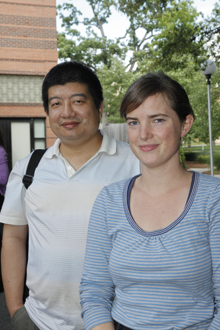Israel Studies Fellows learn, create, disseminate
 Photo/Mike Lovett
Photo/Mike LovettDr. Yang Yang, associate professor and director of the Hebrew Program at Shanghai International Studies University and Julie Grimmeisen, lecturer in Jewish-Islamic studies, faculty of Jewish history and culture at the Ludwig-Maximilian University in Munich, Germany.
Fellows spend two weeks on the Brandeis campus, participating in seminars taught by Israel Studies scholars from around the world, focusing on the state’s society, history, politics, economics, culture, foreign affairs and diplomacy. An additional week is spent in Israel where the group meets with Brandeis faculty along with representatives of Jewish and Arab communities — writers, artists, academics and public officials to hear authentic voices. The number of fellows is capped at 24 in order maintain a seminar atmosphere.
While the objective of the program is to assist the fellows with their teachings, no curriculums or syllabi are supplied for them to bring back; these must be individually designed and tailored to meet the needs of their institutions.
“Here we create an openness to understanding someone else’s view,” says Troen. “We have a byword, a shibboleth, a slogan, which is ‘complexity’.”
Troen stresses the importance of learning opposing viewpoints — how opportunities for such experiences are a priority. On a visit to the Negev, for example, fellows will spend two days with the Bedouins.
“Fellows will hear people complain that their villages are unrecognized,” says Troen. “They will then hear Israeli officials argue that the villages are illegal; we then put one up against the other. We don’t tell people what to think – who are we to tell them?”
Fellows will also meet with the original settlers in the West Bank in Ramallah and with leaders of the Palestinian National Authority to hear their side of what they are doing and the state that they are trying to create.
What is established within the group of fellows is a community of trust, says Troen.
There are now about 165 SIIS Fellows from the past seven years who are in regular contact. They trade reading suggestions and ideas about the various problems that they are facing on their campuses. It’s not a professional organization, Troen notes, but a real society of fellows from every religious background across the globe, with different political views, who engage in real conversation and who have learned to trust one another.
One of this year’s fellows, Dr. Yang Yang, associate professor and director of the Hebrew Program at Shanghai International Studies University, says he hopes to enrich his knowledge about Israel studies for his program and plan the courses for the curriculum, which was established three years ago.
“I’m very interested in Israeli and Arab relations and the conflicts between Israel and Palestine, especially during this time,” says Yang, who has translated two Israeli novels from Hebrew to Chinese.
Julie Grimmeisen, lecturer in Jewish-Islamic studies, faculty of Jewish history and culture at the Ludwig-Maximilian University in Munich, Germany, says while she has teaching experience and has studied intensively about Israel, you can never know enough until you really get to the people.
“In Germany it’s not so easy to get these connections,” Grimmeisen says.
While growing up, Grimmeisen says that The Third Reich and Holocaust were a big part of the German curriculum, but Jewish history itself, or the emancipation of the Jews in Europe or Germany was not.
“I was very interested in Jewish history in Europe and anti-Semitism,” says Grimmeisen. “I’m looking forward to witnessing what we have discussed over the past two weeks, visiting Israel with professional scholars and getting a deeper insight.”
Troen says that people’s views toward Israel are often shaded by moral judgments that tend to put the conflict in black-and-white terms, because they feel that Israel is being treated unjustly or that the Palestinians are being treated unjustly.
“It’s the job of the summer institute to enable the fellows to be able to engage with people who come with fixed and uniformed views,” says Troen. “They either demonize or celebrate one or the other and that’s just not healthy for a classroom. We hope that the kind of civility and openness that we create here will be able to be transported back to wherever our fellows are.”
Categories: Humanities and Social Sciences, International Affairs






